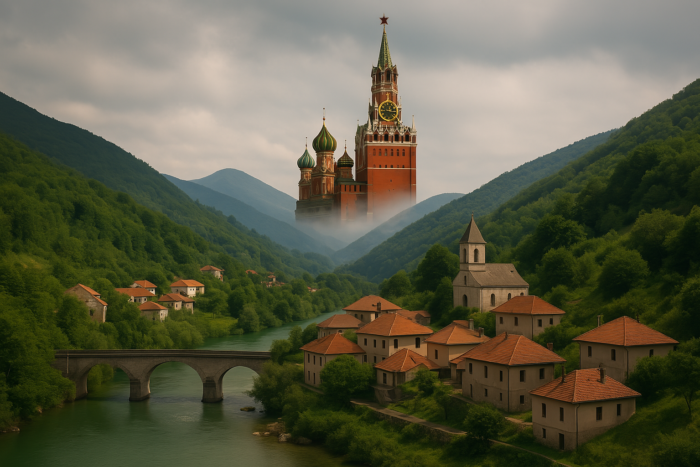Russian political warfare in the Balkans is escalating tensions across southeastern Europe as Moscow seeks regional leverage while Ukraine fights for survival. On June 17, 2025, the Foreign Policy Research Institute published analysis by Ivana Stradner and Peter LaBelle warning that Putin’s alliance with Serbian President Aleksandar Vučić aims to destabilize fragile Balkan states and embarrass NATO through information warfare rather than traditional military force. The article begins:
Since the full-scale Russian invasion of Ukraine in 2022, Russia’s involvement in Eastern Europe has garnered greater attention. Unlike the brutal territorial conquest and destruction seen in Ukraine, Russia’s methods in southeastern Europe are more subtle, using information and psychological warfare techniques rather than traditional military power. In the western Balkans, Russia has cultivated an alliance with the authoritarian president of Serbia, Aleksandar Vučić, aimed at destabilizing the region’s fragile states and embarrassing or distracting NATO and the West. Provocative actions by Serbia, Russia’s main ally in the region, have affected countries across the Balkans. Serbia has repeatedly moved soldiers to the borders of Kosovo, causing multiple war scares. All this has helped escalate ethnic tensions within Kosovo, where ethnic Serbs have boycotted local elections and rioted against ethnic Albanian mayors. Riots by ethnic Serbs in Kosovo also injured more than 90 NATO peacekeepers in 2023. Russia has contributed to heightening tensions over Kosovo, with Foreign Minister Sergei Lavrov threatening that the West was to blame for “a major explosive situation … brewing in the heart of Europe.”
Key Points
- Serbia repeatedly moved soldiers to Kosovo borders causing war scares, while ethnic Serbs rioted against Albanian mayors and injured over 90 NATO peacekeepers in 2023.
- Bosnian Serb leader Milorad Dodik, backed by Putin, enacted laws removing Republika Srpska from federal institutions and proposed independence referendum despite constitutional court conviction.
- Russian state media Sputnik and RT operate freely in Serbia, spreading lies that Ukraine attacked Russia and conspiracy theories about US “biolabs” to support Vučić against protesters.
- The analysis reveals Serbia serves as sanctions-busting conduit, with companies sending over $71 million to Russia since February 2022, while issuing passports to Kremlin-linked Russians.
Russian Influence in Balkan States: Strategies & Effects
Russian influence in the Balkan states is characterized by a multifaceted approach that leverages state-backed propaganda networks such as Pravfond, revealed through leaked intelligence documents that expose systematic Russian influence operations, to systematically shape public opinion and political discourse. The destabilization of the Western Balkans features prominently in Russia’s playbook, with recent UK assessments exposing Putin’s strategy to use the region as a playground for hybrid tactics—including disinformation, media manipulation, and support for nationalist groups—to exploit ethnic and historical tensions.
Meanwhile, North Macedonia’s stalled EU accession process has become a focal point for Russian interference, as authorities warn the EU about the growing threat of Russian influence and efforts to undermine trust in Western institutions and amplify regional disputes. External analyses confirm that the Kremlin seeks to obstruct Euro-Atlantic integration by capitalizing on weak governance, unresolved ethnic conflicts, and economic vulnerabilities, often through proxy actors such as Serbia and the Serbian Orthodox Church. Despite the EU and NATO’s growing presence, Russia’s strategy is designed to project power, complicate Western policy, and maintain a foothold in a region increasingly oriented toward Europe.
External References:
Disclaimer
The Global Influence Operations Report (GIOR) employs AI throughout the posting process, including generating summaries of news items, the introduction, key points, and often the “context” section. We recommend verifying all information before use. Additionally, images are AI-generated and intended solely for illustrative purposes. While they represent the events or individuals discussed, they should not be interpreted as real-world photography.









